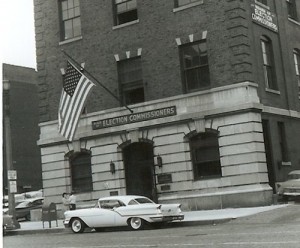We Shouldn’t Finance A New Stadium To Keep The Rams In St. Louis

Last week Gov Nixon took steps to try to keep the Rams NFL franchise in the St. Louis region:
Two civic leaders who played major roles in bringing the Rams to St. Louis have been tapped to play similar roles in trying to keep them here.
Missouri Gov. Jay Nixon discussed the future of the football team during a teleconference this morning.
Nixon is giving attorney Bob Blitz and former Anheuser-Busch executive Dave Peacock 60 days to develop options to be presented to the Rams before Jan. 28, when the team is scheduled to announce if they’ll convert their Edward Jones Dome lease to year-to-year. (KMOX)
I have no doubt the Rams will go year to year, recently readers agreed (see Readers: St. Louis Rams Will Opt Out Of Dome Lease). They’re going to want a new stadium somewhere, no incentive to lock into an old facility for another decade.
It appears many think it is important to keep an NFL team here — at taxpayer expense. I’m all for investing in the region, but only those investments with a high rate of return. For example, historic rehab tax credits.
From 1997:
Sports facilities attract neither tourists nor new industry. Probably the most successful export facility is Oriole Park, where about a third of the crowd at every game comes from outside the Baltimore area. (Baltimore’s baseball exports are enhanced because it is 40 miles from the nation’s capital, which has no major league baseball team.) Even so, the net gain to Baltimore’s economy in terms of new jobs and incremental tax revenues is only about $3 million a year—not much of a return on a $200 million investment. (Brookings Institute — Sports, Jobs, & Taxes: Are New Stadiums Worth the Cost?)
From 2012:
This is an altogether too common problem in professional sports. Across the country, franchises are able to extract taxpayer funding to build and maintain private facilities, promising huge returns for the public in the form of economic development.
For instance, just three of the NFL’s 31 stadiums were originally built without public funds. In two of those cases, public funding was later used to upgrade the stadium or surrounding facilities, even as all 32 of the NFL’s teams ranked among Forbes’ 50 most valuable sporting franchises in the world in 2012. (Only MetLife Stadium, shared by the New York Jets and New York Giants, received no public funding.) (The Atlantic — If You Build It, They Might Not Come: The Risky Economics of Sports Stadiums)
Study after study confirms that public financing of major sports facilities is bad economic policy. I get it, we have people here that like football. For this to make any sense we’d need a team to attract significant new money from outside the region more than a dozen times per year. If Kroenke wants to build a stadium somewhere in the region on his dime then great, otherwise thanks for the one Superbowl win in the last 20 years. Best of luck wherever you end up.
— Steve Patterson



